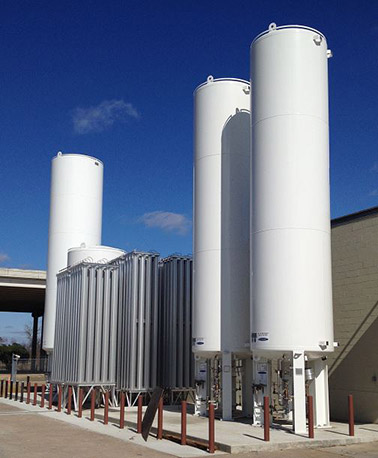Cryogenic storage tanks are specialized containers designed for storing extremely low-temperature liquids. They offer several advantages and play a crucial role in various fields.
Here are some key advantages of cryogenic storage tanks:
- Low-temperature storage capacity: Cryogenic storage tanks are designed for storing liquids such as liquid nitrogen, liquid oxygen, liquid argon, liquid hydrogen, and liquefied natural gas at extremely low temperatures. They provide a stable and long-term low-temperature environment, ensuring that the liquids remain within their required temperature range. This capability makes cryogenic storage tanks highly valuable for the storage and transportation of liquefied gases.
- High sealing capability: Cryogenic storage tanks feature high-quality sealing systems that effectively prevent leakage of liquids and gases. This high sealing capability is crucial for maintaining the stability of liquefied gases and ensuring a safe operating environment.
- Large capacity and efficiency: Cryogenic storage tanks typically have a large capacity, allowing for the storage of significant quantities of liquid. Their design and structure facilitate efficient filling and dispensing processes, improving operational efficiency.
Cryogenic storage tanks find widespread applications in many fields, including but not limited to the following:
- Industrial and manufacturing: Cryogenic storage tanks are extensively used in industrial and manufacturing sectors for storing and supplying liquid gases such as liquid nitrogen, oxygen, and argon. These liquids are utilized as coolants, catalysts, and reaction media in various industrial processes.
- Medical and biology: Cryogenic storage tanks play a critical role in the medical and biological fields. They are used for storing biological samples, cells, tissues, and organs, as well as for cryopreservation of sperm, eggs, and embryos, among other biological materials.
- Aerospace and research: Cryogenic storage tanks are indispensable in aerospace and scientific research. They are utilized for storing liquid rocket fuels and propellants, as well as for low-temperature experiments and research in laboratories.
- Energy and environment: Cryogenic storage tanks have significant implications in the energy and environmental sectors. They are used for storing liquefied natural gas (LNG), liquefied petroleum gas (LPG), and are applied in environmental protection and clean energy technologies involving liquid hydrogen and liquid nitrogen.
In summary, cryogenic storage tanks offer efficient and reliable storage capabilities with diverse applications. They play a vital role in various industries, supporting the storage, supply, and transportation needs of different liquid gases.
Post time: Jun-29-2023

